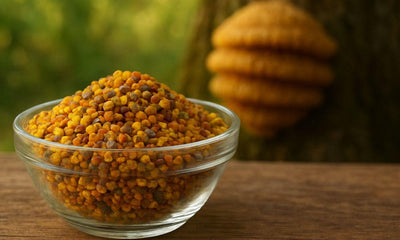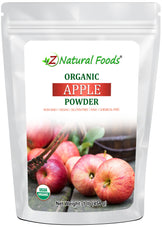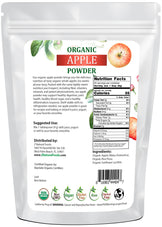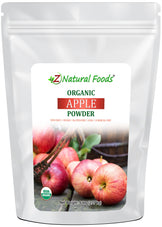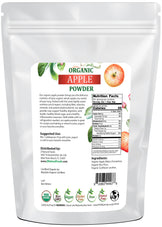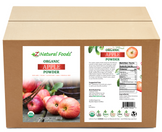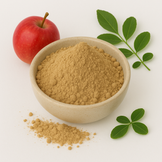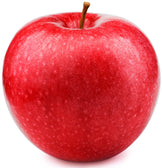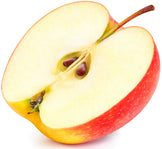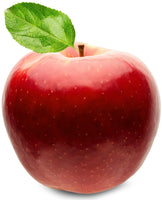Description
Description
As the leaves turn color and the air turns cooler, there's no fruit more iconic of autumn than the apple.
But did you know that this humble fruit isn’t just delicious – it's also packed with health benefits that make it the perfect addition to your fall diet?
Today we dive into why apples are nature's gift to the season, review some fun uses, take a look at what the science says, and how you can enjoy them in a convenient, year-round form.
Why Apples are Autumn's Superstar Fruit
Apples are a superstar fruit for the autumn season because they are easily available, have many incredible health benefits, and provide wonderful additions to an almost endless list of seasonal culinary creations.
Apples are also a nutritional powerhouse - providing a bounty of vitamins, minerals, and fiber, while being relatively low in calories – arguably making apples one of the best foods that could be enjoyed.
Additionally, the familiar texture and range of flavors from sweet to tart make apples perfect for a variety of delicious fall recipes, from toppers to pies to cider.
Apples, A Nutritional Powerhouse
Apples are far more than just a sweet treat.
They're a nutritional powerhouse, loaded with essential nutrients.
Just one, medium-sized apple contains about 95 calories, 4 grams of fiber, and 14% of your daily vitamin C needs. This same apple is also a source of valuable minerals.[8,9]
But this is just the beginning of what this fall favorite has to offer.
Are Apples Considered Antioxidant Champions?
When it comes to antioxidants, apples may truly be champions.
Cornell University researchers have published their findings in Nutrition Journal revealing that apples rank second in antioxidant activity (vitamin C equivalents) compared to many other commonly consumed fruits in the United States[1]. That’s right, these researchers have discovered that apples have more antioxidant-power than red grapes, strawberries, lemons and even more than pineapple – second only to the tart and tasty cranberry.
These antioxidants, particularly polyphenols like quercetin and catechin, are important because these researchers suggest antioxidants like these may help protect your body from oxidative stress and may reduce the risk of some chronic diseases.[1]
Its findings like these that have led to the National Research Council to recommend eating five or more servings of fruits and vegetables a day.[1]
And with apples showing so much incredible promise, an apple a day may make more sense than ever before.
A Healthy Choice During the Tempting Times of the Fall Season
As the weather cools and we start craving comfort foods, it's important to choose healthy options.
Once again, apples have got you covered!
That’s because studies have linked regular apple consumption to a possible lower risk of some diseases that no one would wish upon anybody[4]. In fact, researchers with CSU at Sacramento, California recently published very interesting findings in Advances in Nutrition, discovering that apples and apple juice products may be associated with improved outcomes related to cognitive decline of normal aging, diabetes, weight management, bone health, pulmonary function, and gastrointestinal protection[4].
How can one small – but mighty – fruit do all this?
These researchers suggest that the unique combination of soluble fiber and polyphenols in apples may help protect you against some of these potentially harmful health maladies[1].
Maybe, after all is said and done, this is a good reason to have a slice of Grandma's apple pie!
Can an Apple Help You Stay Slim and Trim?
The potential benefits of eating your apple every day just gets better and better.
And helping you stay trim and slim throughout the fall season may be yet another key attribute of these little beauties.
Once again, apples to the rescue!
Their delicious sweet taste, fiber content, superb nutrition profile and the lower calorie count compared to the plethora of holiday goodies makes apples an incredibly filling and a wonderfully healthy choice.
In fact, publishers with the Journal of Food Sciences report:
The nutrients in apples include macronutrients (e.g., sugars, fibers, pectin, fat, protein), organic acids (e.g., malic acid), vitamins (e.g., C, E, B6), minerals (e.g., potassium, calcium, nitrogen, magnesium), and trace elements (e.g., zinc, iron, copper, manganese).[2]
For comparison, a typical seasonal favorite is a cinnamon snickerdoodle cookie which is primarily composed of carbohydrates and fats and may have about 150 calories (almost 60% more calories than our medium sized apple). Snickerdoodle cookies are generally low in protein and fiber and are not a significant source of vitamins and minerals. But of course, you knew this already.
And if you are one of those rare individuals whose system can tolerate snickerdoodle cookies and enjoy just “one or two”, kudos to you!
But if you are like most of us, prioritizing apples over the plethora of potentially unfriendly food options is probably a wise choice during the fall season.
After all, apples are truly awesome and can help you to stay full, longer as compared to binging on an endless stream of snickerdoodles.
So, can you name another holiday seasonal food that tastes as delicious as an apple, that may be able to help you stay lean and healthy?[4] While healthy competitors probably exist, this is a great reason why apples should be at the top of your list.
And, with a nutrition profile of an apple, it's no wonder apples are a true superfood!
The Science-Backed Benefits of Apples: A Brief Scholarly Overview
Research has identified several key compounds in apples (Malus domestica) that contribute to their health-promoting properties.
Researchers who published their findings in the Journal of Food Science discovered that the most important compounds in apples are primarily polyphenols, including flavonoids (quercetin glycosides, catechins, and anthocyanins), phenolic acids (chlorogenic acid and p-coumaric acid), and dihydrochalcones (phloridzin).[2]
These compounds, along with triterpenes, fiber, vitamins, and minerals, contribute to the overall antioxidant capacity and potential health benefits of apples.[2]
It's important to note that the concentration of these compounds can vary significantly based on factors such as apple variety, growing conditions, ripeness, and storage methods. This is yet another reason why customers choose Z Natural Foods Organic Apple Powder, because our apple farmers strive to maintain the integrity of the ideal landscape for our apple farms.
Additionally, many of these compounds are more concentrated in the apple peel than in the flesh, highlighting the nutritional importance of consuming whole apples with the peel intact.
Fortunately for all of our wonderful customers, Z Natural Foods’ Organic Apple Powder contains the whole apple, including the important apple peel.
Researchers further explain that the synergistic effects of these compounds in whole apples may be more beneficial than isolated components, as suggested by some studies. This emphasizes the importance of considering the complex phytochemical profile of apples in their entirety when evaluating their potential health benefits.[4]
Experts also suggest that the unique compounds in apples exert biological effects and synergistic actions that could ignite the development of evermore apple-based functional foods and further enhance the health-promoting properties of apples.
With all this fantastic research, these are truly exciting times to enjoy an apple a day!
The Unbeatable Convenience of Apple Powder
Beyond its delightful taste, organic apple powder stands out as a superior option for those seeking to harness the nutritional benefits of apples not just in the fall season, but also all year-round.
Organic Apple Powder is a concentrated form of whole, organic apples, and, as you may already know, our air-drying process retains the most essential vitamins, minerals, and phytochemicals found in fresh apples – almost as if you picked a fresh apple off the tree.
Unlike fresh apples, which can spoil quickly, organic apple powder offers extended shelf life and versatility, allowing for easy incorporation into various recipes without the need for washing or peeling.
Moreover, our organic apple powder is derived from high-quality, sustainably grown apples, ensuring that customers receive all the health benefits without harmful additives or preservatives.
By choosing our organic apple powder, you can enjoy the rich flavors and health benefits of apples while conveniently enhancing meals. Here’s just a few benefits:
- Concentrated Nutrients: Apple powder contains all the nutrients of fresh apples in a concentrated form[5].
- Extended Shelf Life: Enjoy the benefits of apples even when they're out of season.
- Versatility: Easily add apple goodness to smoothies, baked goods, or even savory dishes.
- Convenience: No messy washing, peeling, or chopping required!
How to Use Apple Powder
The possibilities of apple powder are endless!
Here are some popular ways to easily incorporate organic apple powder:
- Smoothies: Blend it into your morning smoothie for added flavor and nutrition.
- Baked Goods: Mix it into pancake batter or muffins for a delicious twist.
- Oatmeal: Stir it into your oatmeal for an apple pie-inspired breakfast.
- Soups and Sauces: Use it as a thickener or flavor enhancer in soups and sauces.
- Roasted Vegetables: Sprinkle over roasted vegetables for a touch of sweetness.
- Yogurt: Add it to yogurt for a nutritious snack.
- Energy Balls: Incorporate it into homemade energy balls for a quick pick-me-up.
Here are some simple, creative recipes using organic apple powder:
Apple Cinnamon Overnight Oats
Mix organic apple powder into your overnight oats along with cinnamon, chia seeds, and a touch of honey for a quick and nutritious breakfast.
Apple Pie Smoothie
Blend organic apple powder with Greek yogurt, almond milk, cinnamon, and a frozen banana for a healthy smoothie that tastes like apple pie.
Apple-Infused Energy Balls
Combine dates, nuts, oats, and organic apple powder to make no-bake energy balls for a convenient snack.
Apple Spice Pancakes
Add organic apple powder to your pancake batter along with cinnamon and nutmeg for a fall-inspired breakfast treat.
Apple Vinaigrette Dressing
Whisk organic apple powder with apple cider vinegar, olive oil, and Dijon mustard for a tangy salad dressing.
Apple-Glazed Roasted Vegetables
Mix organic apple powder with olive oil and spices to coat root vegetables before roasting for a sweet and savory side dish.
Apple Cinnamon Muffins
Incorporate organic apple powder into your muffin batter for an extra boost of apple flavor and nutrition.
These recipes are so simple and delicious you are probably wondering how we got the whole recipe in just one sentence. Well, this is true testimony to the incredible, simple, tasty, flavorful benefits of our Organic Apple Powder.
Just remember to adjust the amount of apple powder used based on your taste preferences and the specific product instructions.
An Apple a Day, The Easy Way
As we embrace the cozy comforts of fall, let's not forget the simple joys – and incredible health benefits – of the simple apple.
Z Natural Foods' Organic Apple Powder makes it easier than ever to enjoy these benefits not just in the fall season with your cider, shakes, yogurt, and your slice of apple pie, but every day of the year.
Whether you're biting into a crisp, fresh apple or stirring in a tablespoon or two of our organic apple powder into your favorite recipe, you're giving your body a boost of nutrition that's perfectly in tune with the season.
Here's to your health this fall season and beyond!
For More Information about our Organic Apple Powder
Z Natural Foods offers a premium Organic Apple Powder that captures all the goodness of whole apples in a convenient, shelf-stable form. Our Apple Powder is Certified USDA Organic, carefully air-dried to preserve maximum nutrients, contains no harmful additives or preservatives and is the perfect addition to our pantry staples. Go here for more information: Organic Apple Powder.
References:
- Boyer, Jeanelle, and Rui Hai Liu. "Apple Phytochemicals and Their Health Benefits." Nutrition Journal 3, no. 1 (2004): 5. https://www.ncbi.nlm.nih.gov/pmc/articles/PMC442131/.
- Oyenihi, Ayodeji B., Zinash A. Belay, Asanda Mditshwa, and Oluwafemi J. Caleb. "'An Apple a Day Keeps the Doctor Away': The Potentials of Apple Bioactive Constituents for Chronic Disease Prevention." Journal of Food Science 87, no. 7 (2022): 2811-2826. https://www.ncbi.nlm.nih.gov/pmc/articles/PMC9321083/.
- Jiang, Liyuan, Yujie Zhong, Yao Zu, Xiaoyan Liu, Xuemei Liu, Donglin Zhang, and Zhiqin Zhou. "Metabolomics Analysis Reveals the Chemical Composition Differences and Antioxidant Activity of Five Apple Cultivars." Food and Bioprocess Technology 16 (2023): 1211-1224. https://link.springer.com/article/10.1007/s11947-023-03208-9.
- Hyson, Dianne A. "A Comprehensive Review of Apples and Apple Components and Their Relationship to Human Health." Advances in Nutrition 2, no. 5 (2011): 408-420. https://www.ncbi.nlm.nih.gov/pmc/articles/PMC3183591/.
- Z Natural Foods. "Organic Apple Powder." Accessed October 1, 2024. https://www.znaturalfoods.com/products/apple-powder-organic.
- Cleveland Clinic Newsroom. "Why Apples Are a Great Pick This Fall." September 25, 2023. https://newsroom.clevelandclinic.org/2023/09/25/why-apples-are-a-great-pick-this-fall.
- Luo, Jiaojiao, Xiaoyan Zhang, Yujie Zhong, Liyuan Jiang, Xuemei Liu, Donglin Zhang, and Zhiqin Zhou. "Comparative Analysis of Phenolic Compounds, Antioxidant Activity, and Mineral Elements of 27 Apple Cultivars." Foods 12, no. 15 (2023): 2986. https://www.ncbi.nlm.nih.gov/pmc/articles/PMC10494637/.
- U.S. Department of Agriculture. "Apples, Raw, With Skin." FoodData Central. Accessed October 2, 2024. https://fdc.nal.usda.gov/fdc-app.html#/food-details/171688/nutrients.
- Institute of Medicine (US) Panel on Dietary Antioxidants and Related Compounds. "Vitamin C." In Dietary Reference Intakes for Vitamin C, Vitamin E, Selenium, and Carotenoids. Washington (DC): National Academies Press (US), 2000. https://www.ncbi.nlm.nih.gov/books/NBK225480/.

